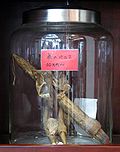Deer penis
Deer penis is an organ of male deer that has been used in traditional Chinese medicine for centuries. It is believed to have various medicinal properties, including improving sexual function, enhancing physical strength, and increasing vitality. The use of deer penis in medicinal practices is rooted in the concept of "like cures like," a principle that suggests consuming the organ of an animal will improve the function of the same organ in humans.
Traditional Uses[edit]
In traditional Chinese medicine, deer penis is often prepared in soups or alcohol infusions. It is thought to be particularly beneficial for men, with claims that it can boost libido, treat erectile dysfunction, and improve overall sexual health. The organ is typically harvested from deer that are either farmed for this purpose or hunted in the wild. After removal, the penis is dried and can be stored for long periods before use.
Preparation and Consumption[edit]
The preparation of deer penis involves several steps. First, the organ is thoroughly cleaned and dried. It can then be soaked in alcohol to create a tonic, which is believed to concentrate its medicinal properties. Alternatively, the dried penis may be boiled in water, often with other herbs and ingredients, to make a broth. This broth is consumed in the belief that it will impart the health benefits associated with deer penis.
Scientific Perspective[edit]
From a scientific standpoint, there is limited evidence to support the claimed health benefits of consuming deer penis. While some components found in deer tissue may have nutritional or medicinal value, the specific effects of deer penis consumption on human health have not been extensively studied. Critics of traditional medicine practices involving animal parts often cite concerns over sustainability, animal welfare, and the potential for placebo effects.
Controversy and Conservation[edit]
The use of deer penis in medicine has led to controversy, particularly regarding the ethical treatment of animals and conservation issues. Some species of deer are endangered or protected, and the demand for deer penis can contribute to illegal hunting and poaching. There are calls for more sustainable and humane practices in the harvesting of deer organs for medicinal use.
Conclusion[edit]
Deer penis remains a component of traditional Chinese medicine, with a history of use that spans centuries. While it is revered by some for its supposed health benefits, the lack of scientific evidence and concerns over ethical and conservation issues present challenges to its acceptance in modern medicine.
-
Deer penis in a Chinese medicine shop in Yokohama
-
Deer penis wine
-
Deer penis in a health store in Shanghai
Ad. Transform your life with W8MD's Budget GLP-1 injections from $75


W8MD offers a medical weight loss program to lose weight in Philadelphia. Our physician-supervised medical weight loss provides:
- Weight loss injections in NYC (generic and brand names):
- Zepbound / Mounjaro, Wegovy / Ozempic, Saxenda
- Most insurances accepted or discounted self-pay rates. We will obtain insurance prior authorizations if needed.
- Generic GLP1 weight loss injections from $75 for the starting dose.
- Also offer prescription weight loss medications including Phentermine, Qsymia, Diethylpropion, Contrave etc.
NYC weight loss doctor appointmentsNYC weight loss doctor appointments
Start your NYC weight loss journey today at our NYC medical weight loss and Philadelphia medical weight loss clinics.
- Call 718-946-5500 to lose weight in NYC or for medical weight loss in Philadelphia 215-676-2334.
- Tags:NYC medical weight loss, Philadelphia lose weight Zepbound NYC, Budget GLP1 weight loss injections, Wegovy Philadelphia, Wegovy NYC, Philadelphia medical weight loss, Brookly weight loss and Wegovy NYC
|
WikiMD's Wellness Encyclopedia |
| Let Food Be Thy Medicine Medicine Thy Food - Hippocrates |
Medical Disclaimer: WikiMD is not a substitute for professional medical advice. The information on WikiMD is provided as an information resource only, may be incorrect, outdated or misleading, and is not to be used or relied on for any diagnostic or treatment purposes. Please consult your health care provider before making any healthcare decisions or for guidance about a specific medical condition. WikiMD expressly disclaims responsibility, and shall have no liability, for any damages, loss, injury, or liability whatsoever suffered as a result of your reliance on the information contained in this site. By visiting this site you agree to the foregoing terms and conditions, which may from time to time be changed or supplemented by WikiMD. If you do not agree to the foregoing terms and conditions, you should not enter or use this site. See full disclaimer.
Credits:Most images are courtesy of Wikimedia commons, and templates, categories Wikipedia, licensed under CC BY SA or similar.
Translate this page: - East Asian
中文,
日本,
한국어,
South Asian
हिन्दी,
தமிழ்,
తెలుగు,
Urdu,
ಕನ್ನಡ,
Southeast Asian
Indonesian,
Vietnamese,
Thai,
မြန်မာဘာသာ,
বাংলা
European
español,
Deutsch,
français,
Greek,
português do Brasil,
polski,
română,
русский,
Nederlands,
norsk,
svenska,
suomi,
Italian
Middle Eastern & African
عربى,
Turkish,
Persian,
Hebrew,
Afrikaans,
isiZulu,
Kiswahili,
Other
Bulgarian,
Hungarian,
Czech,
Swedish,
മലയാളം,
मराठी,
ਪੰਜਾਬੀ,
ગુજરાતી,
Portuguese,
Ukrainian


